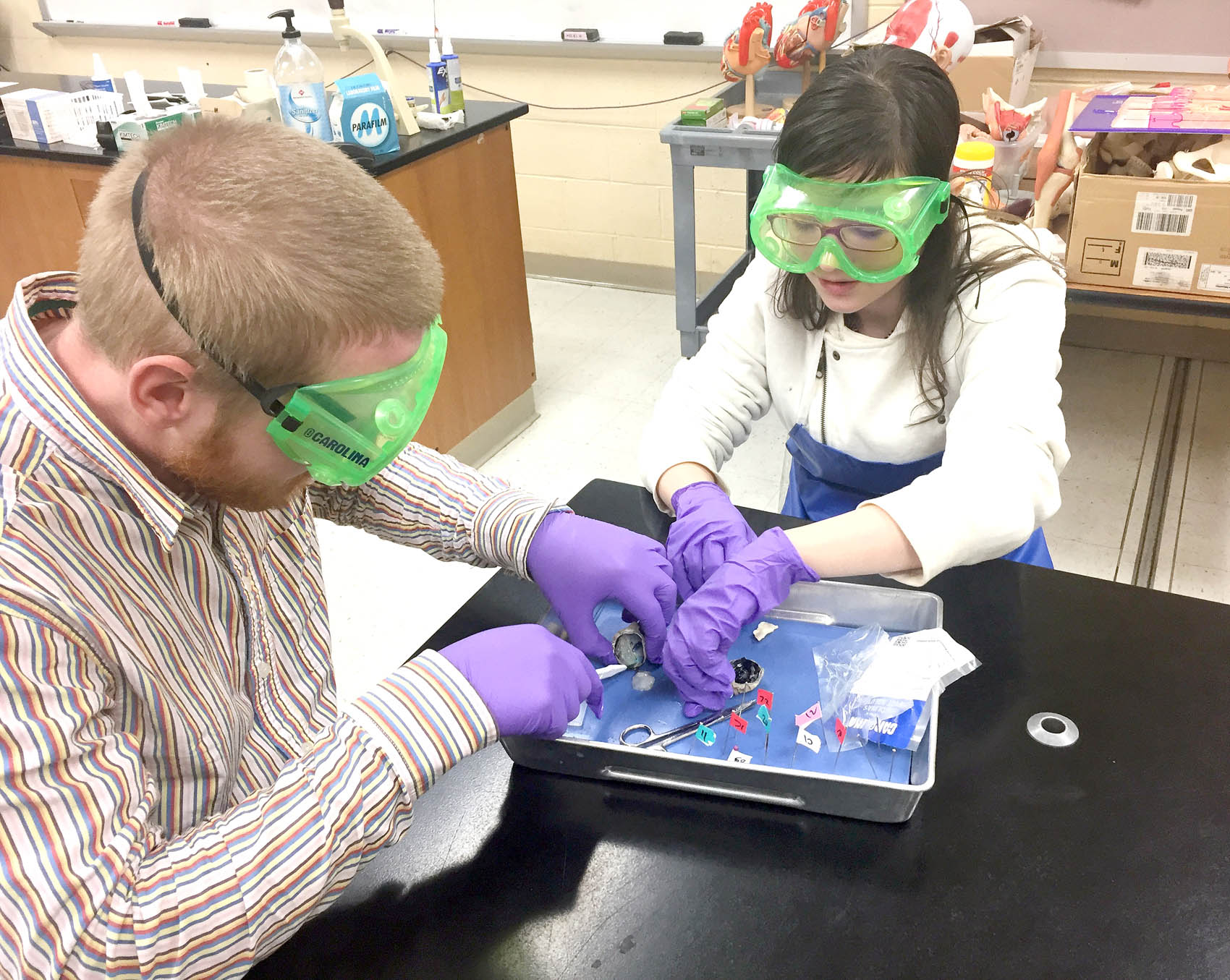College News
CCCC Laser and Photonics students learn about eyes
Notice: This article is older than 12 months. Names, contact information, programs, titles, etc. might have changed. If you have any problems please call the main college number, 1-800-682-8353, and we will be happy to direct you accordingly.

click image to enlarge ⊗
Central Carolina Community College students Christopher Martin and Ruth Gietzen gain a new perspective ... (more)
12.26.2016 • College & Community • College General • Continuing Education • Students/Graduates
SANFORD - It's probably the last place Laser and Photonics students expected to be on a Monday morning: in a college biology lab standing over sheep eyes.
"I will admit, I wasn't particularly looking forward to dissecting an eye," wrote Dustin Krombach one week later in an email about the experience. "But after it was said and done, I feel like it was well worth it!"
Dissections certainly aren't part of the standard Laser and Photonics Technology curriculum at Central Carolina Community College. The Associate Degree program combines courses in electronics, math, and the science behind transmitting light to help students prepare for work as technicians in industries as diverse as medicine and manufacturing.
But when the employment recruiter for a company selling medical lasers stopped by CCCC's Harnett Main Campus last spring to meet with students, he had a suggestion: How about adding some sort of anatomy lab to the curriculum?
Teacher Gary Beasley gave it some thought. "I told him we could add something about eyes," he replied, "because we already study eye safety in the Laser classes."
It didn't take long to make it happen. Beasley reached out to Emma Belcher, his colleague teaching Biology, who agreed to put together an hour-long lecture and lab on parts of the eye and the impact of lasers.
She began with a large model of the eye, removing each part and discussing its function, before opening the floor for questions. Students asked about cataracts, a medical condition where vision gradually becomes cloudy, and then a question that even got the instructor thinking: If blood vessels in one layer of the eye burst, where would the blood flow?
"It was a very inquisitive group," Belcher said.
The presentation ended with a video about the dissection process and students carefully opening sheep eyes to examine the parts they had just discussed. It was a fairly casual presentation, but made quite an impression.
"We study parts of the eye and the impact lasers can have on it, but we never had a chance to actually see it," Beasley said. "Getting to see what a cornea, lens, and retina look like, and to understand how thin and delicate the retina really is, that gave everyone a wider perspective on the damage a laser could do."
Morgan Adams was one of the second-year students participating. And, it changed how he looks at eye safety. "I now have a greater understanding of how preciously fragile our vision is for us," he said. "I don't think I will ever complain about wearing eye protection again."
The entire experience was so effective, in fact, that another eye-dissection lab is already on the schedule for spring. Depending on how much time she has, Belcher plans to dive even deeper into the subject.
"This was so successful because a lot of students learn better with a hands-on activity -- having a model to take apart and a real eye to dissect -- instead of just looking at a diagram in the textbook," she explained. "This really gets them engaged."
For more information about the CCCC Laser & Photonics Technology program, contact Gary Beasley at the CCCC Harnett Main Campus at (910) 814-8828 or by email at gbeasley@cccc.edu.
For more information on Central Carolina Community College, visit the website www.cccc.edu.
Categories
- Admin, Faculty & Staff Category
- Arts & Entertainment Category
- Clubs Category
- College & Community Category
- College General Category
- Continuing Education Category
- Curriculum Programs Category
- Distance Education Programs Category
- Facilities/Buildings Category
- Finances Category
- Foundation Category
- Graduations Category
- Lee Early College Category
- NCCCS Category
- SGA Category
- Special Events Category
- Sports Category
- Students/Graduates Category
- Uncategorized Category
Archives

